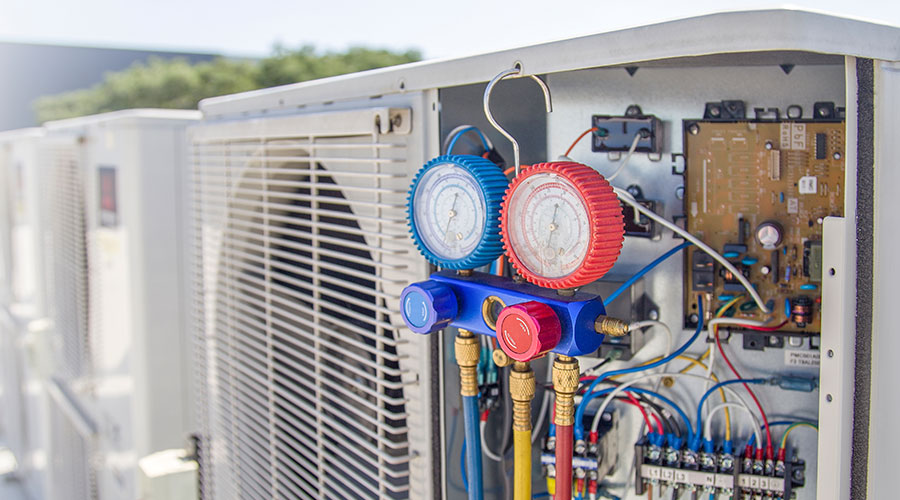HVAC systems are vital to a healthcare facility functioning as it should. To make sure the HVAC systems keep operating properly, they need to be looked at and may need to receive maintenance from time to time. In this manufacturer roundtable, Healthcare Facilities Today speaks with HVAC manufacturers about when to maintenance these systems.
When should facility managers have their HVAC systems looked at or receive maintenance?
“Maintenance is dictated by usage and application, but a facility manager should expect to change filters as often as monthly. Equipment should be serviced twice a year, during the crossover period between heating and cooling seasons. Regular service intervals will maintain equipment efficiency extend HVAC system lifecycle.”
— Dennis Stinson, vice president of sales, Fujitsu General America, Inc.
“At minimum, humidity control equipment should be inspected and maintained at the beginning and end of each operating season. More frequent intervals may be needed depending on level of use, type of equipment and local water quality. Regular inspection, calibration and servicing of humidity control equipment ensures optimal performance and maximizes longevity. A comprehensive maintenance schedule mitigates risks of downtime and equipment failure. The type of equipment selected and its integration with other systems (i.e., water treatment) will impact the frequency and difficulty of maintenance required.”
— Jennifer Montville, director of marketing, DriSteem
“I think ASHRAE does a pretty good job of making recommendations around HVAC maintenance in healthcare facilities. To do this question justice, you really need to consider the different system types that can exist in healthcare facilities. In my opinion, ASHRAE 170 is a good resource. In the standard there is an appendix section that outlines recommendations for various aspects of HVAC systems in healthcare settings, including maintenance considerations.
In addition to ASHRAE, OEMs also offer recommendations regarding inspections, cleaning of their equipment, and filter replacements. You might also consider how often you Test and Balance your systems and get ducts cleaned as well. Again, I will say that best-in-class healthcare facilities, that are challenged with driving energy and operational efficiencies, are moving to cloud-based, connected platforms that can help them become more proactive and predictive with their maintenance as opposed to scheduled or reactive approaches saving them money and downtime in the future.”
— Brian T. Estill, portfolio director – healthy buildings and sustainability, Johnson Controls
“Facility managers inspect and maintain their HVAC systems regularly to ensure optimal performance and prevent potential issues. Here are some general guidelines for HVAC system maintenance:
- Scheduled Maintenance: HVAC systems should receive routine maintenance at regular intervals. Typically, it is recommended to schedule maintenance twice a year - once before the cooling season (spring) and once before the heating season (fall). This regular maintenance helps address any wear and tear, ensure system efficiency and identify and fix potential problems before they escalate.
- Filter Replacement: HVAC system filters should be checked and replaced regularly, typically every one to three months, depending on the type of filter and the facility's needs. Clogged or dirty filters can hinder airflow, reduce system efficiency and affect indoor air quality.
- Seasonal Inspections: Before each season, it is beneficial to conduct a thorough inspection specific to the upcoming weather conditions. For example, before the start of the cooling season, the system should be checked for refrigerant leaks, proper coil cleanliness and efficient fan operation. Similarly, before the heating season, inspections should focus on combustion efficiency, heating element functionality and safety controls.
- Manufacturer Recommendations: Follow the manufacturer's guidelines for HVAC system maintenance. Manufacturers usually provide specific instructions regarding maintenance intervals, recommended service tasks, and necessary adjustments. Adhering to these recommendations can help maintain warranty coverage and ensure the system's longevity.
- Performance Degradation: If occupants notice a decline in comfort, unusual noises or increased energy bills, it may indicate a problem with the HVAC system. In such cases, it is advisable to schedule maintenance or have a technician inspect the system promptly.
- Professional Assistance: HVAC system maintenance should be carried out by certified technicians or HVAC professionals. These professionals have the expertise to identify and resolve issues, perform necessary repairs and keep the system in optimal condition.
Remember that specific HVAC systems may have unique maintenance requirements. It is best to consult the system's manual or contact the manufacturer for detailed maintenance guidelines. Additionally, local regulations or industry standards may also affect maintenance schedules.”
— Christy Fetsch, CEM, LEED AP, healthcare vertical market strategy leader, Trane
Jeff Wardon, Jr. is the assistant editor for the facilities market.

 What 'Light' Daily Cleaning of Patient Rooms Misses
What 'Light' Daily Cleaning of Patient Rooms Misses Sprinkler Compliance: Navigating Code Mandates, Renovation Triggers and Patient Safety
Sprinkler Compliance: Navigating Code Mandates, Renovation Triggers and Patient Safety MUSC Board of Trustees Approves $1.1B South Carolina Cancer Hospital
MUSC Board of Trustees Approves $1.1B South Carolina Cancer Hospital Study Outlines Hand Hygiene Guidelines for EVS Staff
Study Outlines Hand Hygiene Guidelines for EVS Staff McCarthy Completes $65M Sharp Rees-Stealy Kearny Mesa MOB Modernization
McCarthy Completes $65M Sharp Rees-Stealy Kearny Mesa MOB Modernization